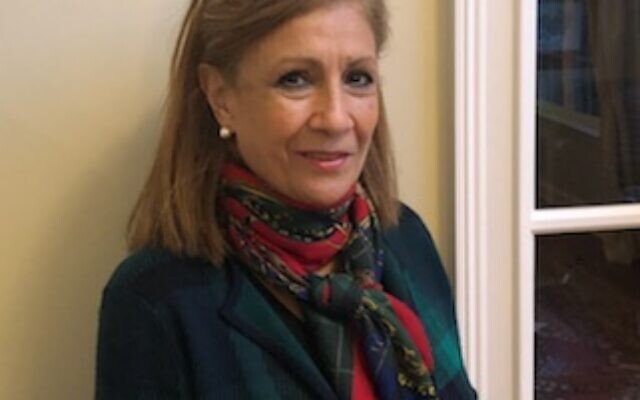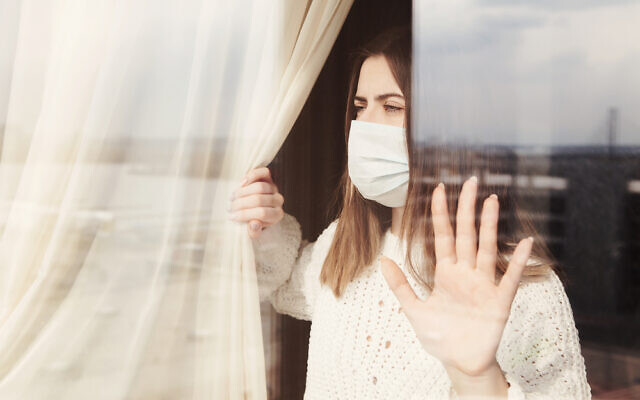Psychiatrist Details Hike in Anxiety
Social isolation is taking its toll, new CDC study finds, and Dr. Annie Cooper sees similar mental health disorders among her patients.
In a recent study by the Centers for Disease Control and Prevention, the Atlanta-based health organization found that about a third of the respondents reported symptoms of anxiety or depression, nearly as many trauma or stress, and 13 percent started or increased drug abuse associated with COVID.
The study conducted in late June assessed mental health, substance abuse and suicidal intentions with almost 5,500 adults responding.
Nearly 11 percent of the respondents said they had seriously considered suicide in the preceding 30 days, more than twice the rate reported in a 2018 survey, according to the CDC’s Morbidity and Mortality Weekly Report issued Aug. 14.
 Dr. Annie Cooper, who specializes in anxiety and depressive illnesses, is not surprised by the data. She has been seeing a significant increase in anxiety, depression and stress in her patients since the pandemic began.
Dr. Annie Cooper, who specializes in anxiety and depressive illnesses, is not surprised by the data. She has been seeing a significant increase in anxiety, depression and stress in her patients since the pandemic began.
The AJT posed questions to the doctor via Zoom. Here are her responses:
AJT: What makes this situation exceptional?
Cooper: There has not been, in modern times, a pandemic of such magnitude and one that has caused such high rates of mortality, except perhaps during the Spanish flu [1918-19]. We are living in a state of exception with exceptional measures that hinder individual freedom. When this all started in March, people thought that within three months we would have answers and a path out of this situation. But we don’t see the end of the tunnel; our way of life is on hold until further notice. … In this situation, we don’t know, and this uncertainty contributes to the anxiety.
AJT: What sources of anxiety, specifically related to COVID, do you notice in your patients?
Cooper: Isolation is very difficult to endure. Everything that used to be a part of our lives is turned upside down. Even becoming a hermit in a monastery requires a preparation that lasts for years. You train yourself for isolation. Here, we were plunged into this state from one day to the next. We live in an abnormal situation and we were unprepared for it. The difficulty for the psychiatrist is that the solutions that are normally recommended to combat anxiety are no longer available. Seeing people, playing sports, using support groups, doing volunteer work (at church or synagogue) are now forbidden.
Also, there are very realistic and legitimate fears at the source of anxiety. For some people, the fear of losing their job. … I hear a lot of fear about insecurity and a very real fear of social crisis.
AJT: According to the cited CDC report, these symptoms varied significantly depending on whether a woman, a young person, or an elderly person?
Cooper: Concerning women, it is not necessarily related to the situation; women are generally more likely to get treated for anxiety or depression. But young people are in a bad way. First, because friends, parties and outings are an important part of their social development and they are deprived of them. What’s more, they are often blamed for their risky behavior. I don’t agree with the notion that they are selfish. Young people don’t have the same sense of fear that older people have. …
Concerning elderly people, of course, they are at risk. But, the irony of the situation is that we are considered high risk beginning between the ages of 60 and 65! And therefore vulnerable. But we have created a society which promotes anti-aging. We have to be in shape, have cosmetic surgery, look younger. With COVID, we are now confronted with our fragility, with our REAL age.
AJT: Do you see excess behavior or irrational fears?
Cooper: I know people who haven’t left their homes since mid-March. It’s an overreaction, but you can’t force them to do things that make them feel uncomfortable. The Japanese identified this phenomenon; they call it hikikomori. It mainly concerned teenagers who stayed in their rooms for months or even years, connected only to a virtual world. On a lesser level, it is an irony of fate that hikikomori, this pathological state, is what we are now asking our children to do: stay in their room in front of their computer! …
For healthy people, when it is safe to go outside, they will return to a normal social life. But for those who have latent symptoms of social anxiety (a form of fear of others) or avoidant disorder personality (when one does not want to be with others) one must identify one’s symptoms, even if they are minimal, in order to fight them now. It is essential to differentiate between the fear of going out because you are a person at risk as opposed to the fear of going out because you don’t want to go out anymore.




comments